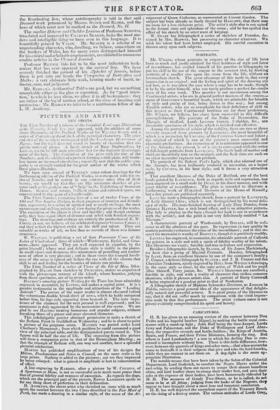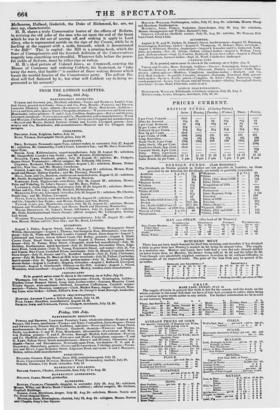CARICATURES.
H. B. has given us an amusing version of the contest between Dort Pedro and his hopeful brother Miguel, by making the battle royal com- mence with a stand-up light; John Bull being the time-keeper, Lords Grey and Palmerston, and the Duke of Wellington and Lord Aber- deen, the respective seconds and bottle-holders ; the Rings of Austria, Spain, and France, and their Prime Ministers, forming the ring. But where is Lord Londonderry? a row in which his darling Don is con- cerned is incomplete without him. There is this little difference, how- ever, between the quarrels of kings and other men,—that when monarchs come to fisticuffs it is their subjects that give and take the hard knocks, while they are content to set them on. A dog-fight is the more ap- propriate illustration. The notable means that have been taken by the Solon of the Colonial Department, Lord Goderieh, to comfort the Negro Slaves under the cart-whip, by sending them out razors to scrape their almost beardless chins, and hard leather 'shoes to cramp their tender feet, and save their soles at the expense of their bodies, have been humorously ridiculedly H. 13. The measures of Goody Two-Shoes, as he is called, do not seem to be at all filling; judging from the looks of the Negroes, they appear to have brought about a most lame and impotent conclusion. H. B. has well depicted the somnolent aspect of the Treasury Bench on the rising of a drowsy orator. The various attitudes of Lords Grey,,
Melbourne, Holland, Goderich, the Duke of Richmond, &c. are, we dare say, characteristic.
H. B. shows a truly Conservative horror of the effects of Reform, in reviving the old joke of the man who sat upon the end of the beam which he was in the act of sawing off, and making it apply to Lord ,Grey, who is represented astride on the sign of the Crown, while he is hacking at the support with a, sickle, forsooth, which is denominated "the Bill!" This is capital: the Bill is a pruning-book, which the fears of Corruptionists and the feverish delirium of the Conservatives magnify into something very dreadful. Whatever falls before the peace- ful sickle of Reform, must be either ripe or rotten. H. B.'s ideal picture of Colonel Jones, as Cromwell, entering the House of Commons and ordering Cobbett, his lieutenant, to "take away the mace, that bauble!" is another of those waking dreams which 'haunt the morbid fancies of the Conservative party. The gallant Ra- dical will feel flattered by it; but what will Cobbett say to being re- presented as his servant?



























 Previous page
Previous page